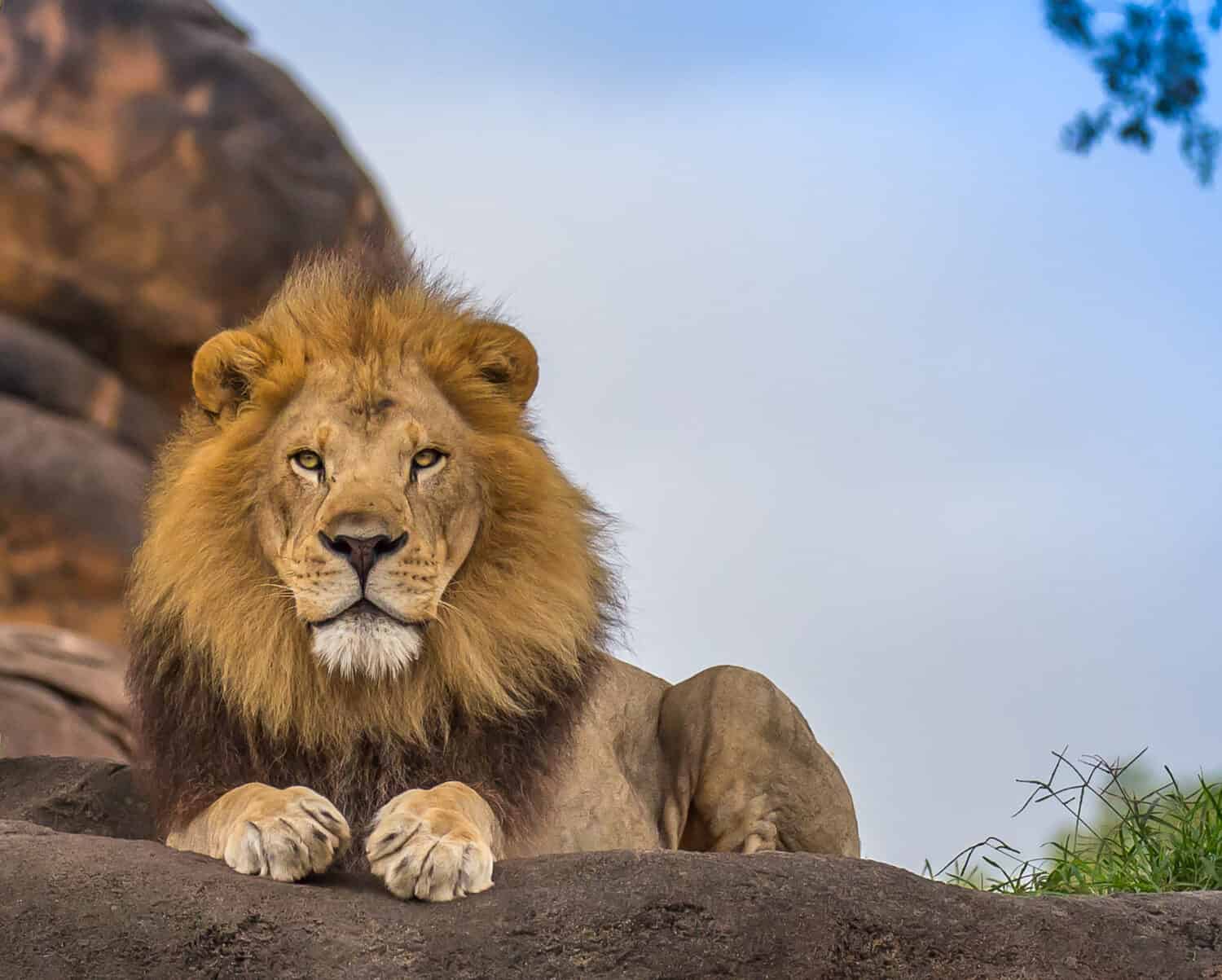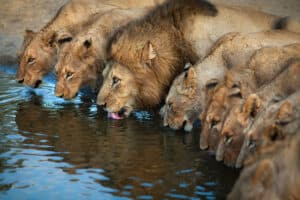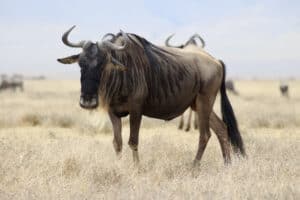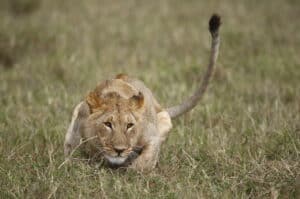
Usually, when we think of lions, Africa comes to mind. Considering that the range of lions is limited to Sub-Saharan Africa, that makes sense. But in ancient times, they covered a lot more territory, including the Middle East, India, and even parts of Southeastern Europe. It’s not surprising, then, that the magnificent “king of beasts” would figure prominently in the art, folklore, and literature of a wide geographic area. Lions are mentioned more frequently than any other wild animal in the Bible. The writers used lions as both positive and negative examples. Most surprisingly, they are used metaphorically to represent both Jesus and Satan. This article will introduce you to some of the most important passages of the Bible that mention lions and explain their significance and symbolism.
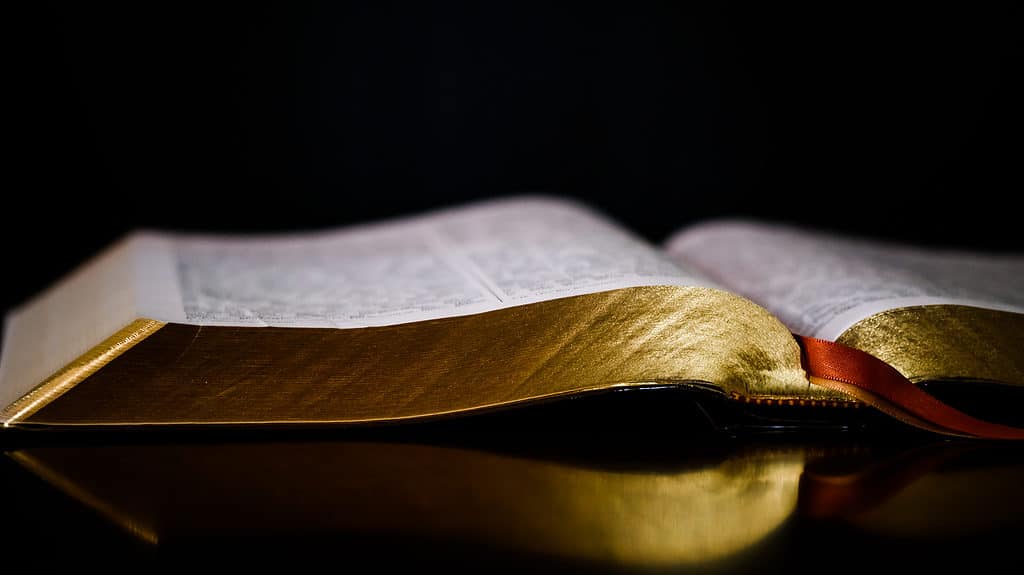
The Bible mentions lions more frequently than any other wild animal.
©iStock.com/NoonVirachada
Lions in Antiquity
Many cultures admired lions for their size, power, ferocity, stately bearing, and dominance over all other species. Lions became a popular symbol for royalty in Greece, Egypt, and Rome. The Romans used the lion as an insignia for their legions. The Roman emperors kept lions in private zoos and used them in hunts, gladiator spectacles, and as a means of executing criminals, often in public for entertainment. The Assyrian, Babylonian, and Persian kings also kept lions in private collections. One of the most famous stories in the Bible describes how the king of Persia threw the prophet Daniel into a pit of hungry lions. Miraculously, they didn’t hurt him, but when the king had Daniel’s enemies thrown into the pit, the vicious predators immediately devoured them.
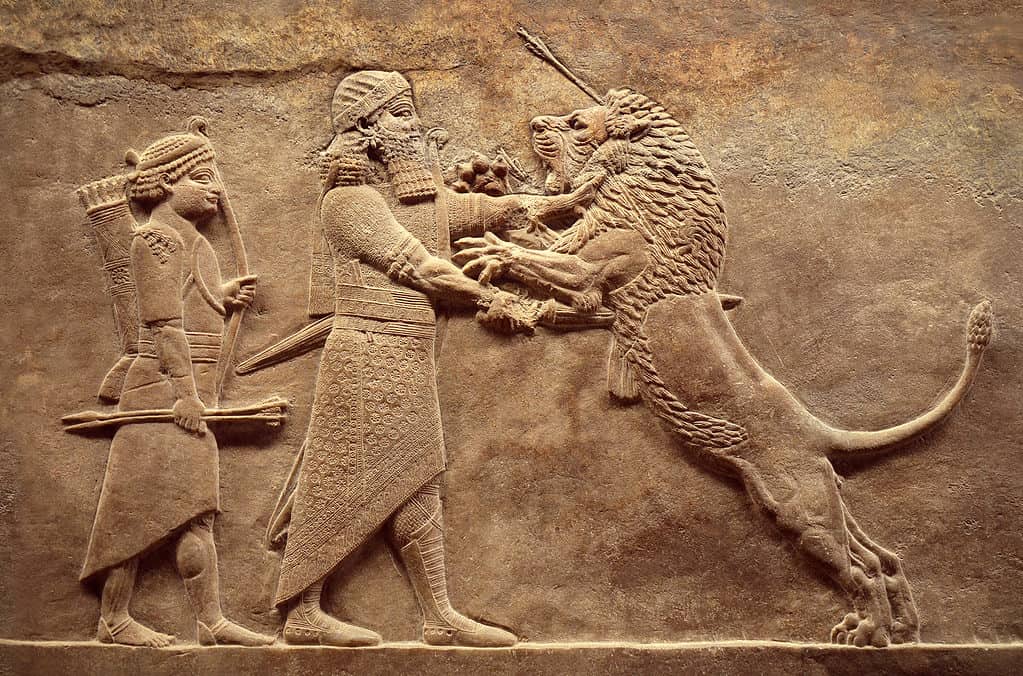
This Mesopotamian wall relief shows that lions were well-known in ancient Iraq.
©Viacheslav Lopatin/Shutterstock.com
Lions as Natural Threats
In the Bible lions often feature as a natural threat that was part of the reality of life in the ancient Middle East.
- The prophet Samson, famous for his strength, killed a lion with his bare hands.
- Before he became King of Israel, David was a shepherd who defended his flocks from large predators such as bears and lions.
- The kingdom of Assyria conquered Israel and began settling other conquered people groups there. Lions attacked them, prompting the newcomers to ask about the God of Israel and how to please him so he would allow them to live in the land.
- The prophet Jeremiah mentioned how lions would come up from the thickets along the Jordan River to attack livestock in pastureland (Jeremiah 49:19).
- The book of Proverbs comments that a lazy person will make up excuses not to work, such as the fear that a lion will get them.

In ancient times, lions lived in the thickets along the Jordan River. This picture was taken in South
Africa
but suggests what that might have looked like.
©PACO COMO/Shutterstock.com
“Lion” as a Compliment
One of the highest compliments in the Bible is to describe someone as a “lion.”
- Jacob compared three of his sons to lions: Judah was like a crouching lion, ready to pounce; Dan was a springing lion’s cub; and Gad tears at his enemies’ arms and heads like a lion.
- Proverbs a book of wise sayings in the Bible, says that righteous people are as bold as lions.
- King David memorialized the previous king, Saul, and Saul’s son, Jonathan, as “swifter than eagles” and “stronger than lions.”
- Isaiah, Lamentations, and Hosea describe God as a roaring lion ferociously protecting his people,
- A popular Christian name for Jesus is the “Lion of the Tribe of Judah.” The last book of the Bible, Revelation, refers to him in this way to emphasize his total victory at the end of the world.
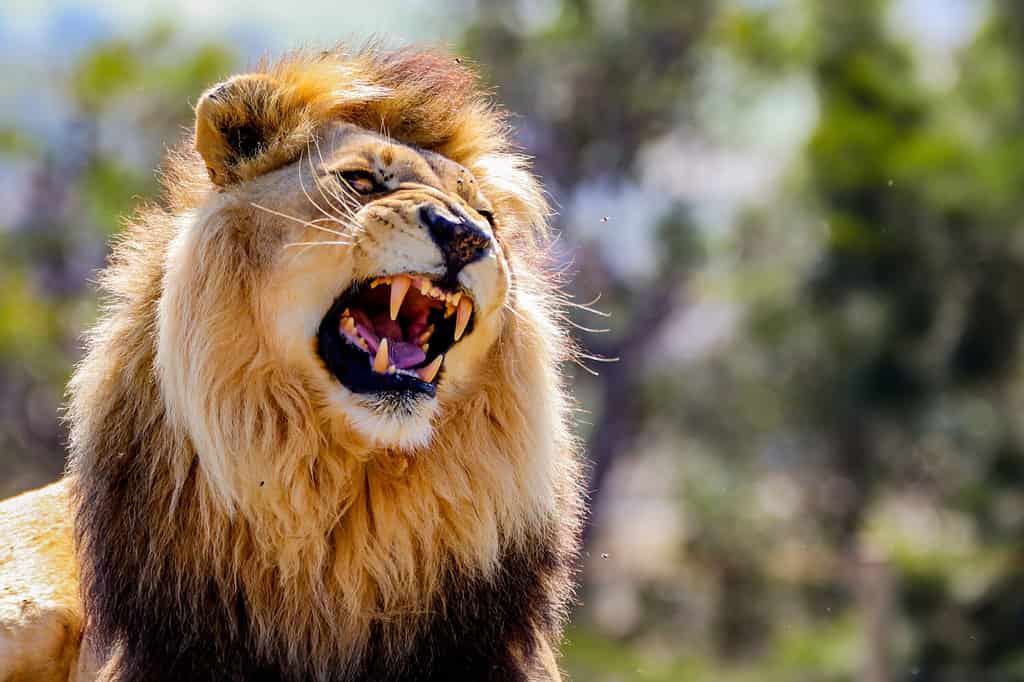
Comparing a leader, or God himself, to a lion in the Bible expressed admiration for their strength, bravery, and ferocity.
©SteffenTravel/Shutterstock.com
Lions in Ancient Jewish Decorative Arts
The Bible doesn’t say a great deal about decorative arts, with two exceptions. It describes in great detail the design of the Tabernacle and the Temple, Israel’s temporary and permanent worship facilities, and it describes some aspects of the royal palace. Lions were a prominent part of the design of both facilities:
- The Israelites decorated some of the furnishings of their Temple with images of lions, angels, and oxen.
- The king’s throne sat on top of six steps with carved lions on either side of each step and to the right and left of the throne.
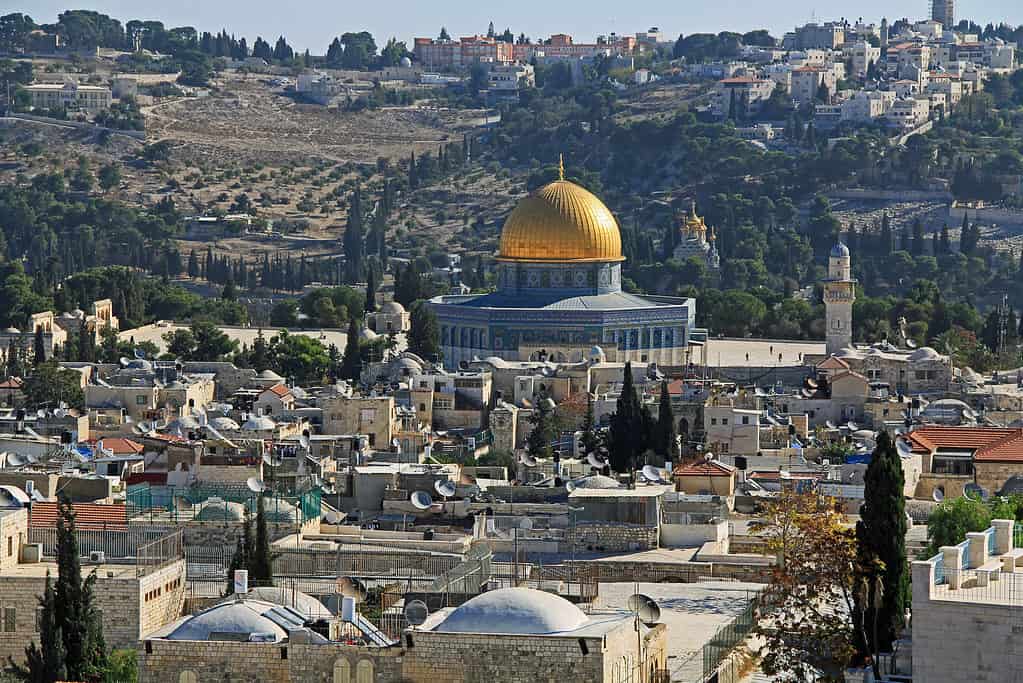
The Jewish temple, which sat on the site of the present-day Islamic Dome of the Rock, included images of lions as decorative features.
©iStock.com/LindaJohnsonbaugh
Lions as Symbols of Evil
Despite all the positive references to lions and their qualities, the Bible also uses them to evoke the horrifying qualities of the enemies of God’s people.
- Psalms 7:2 describes evil people as having the ferocity of lions, ready to rip innocent people to pieces.
- Psalms 10:9 pictures wicked people as stealthy lions lying in wait to catch unsuspecting victims.
- Some of the Old Testament prophets depicted nations that threatened Israel as being like lions.
- The New Testament writers used the phrase “the lion’s mouth” to refer to situations of great danger. For instance, the Apostle Paul wrote that God had rescued him “from the lion’s mouth,” referring to the opponents who persecuted him.
- The apostle Peter said that the devil, or Satan, prowls around like a roaring lion in search of prey.
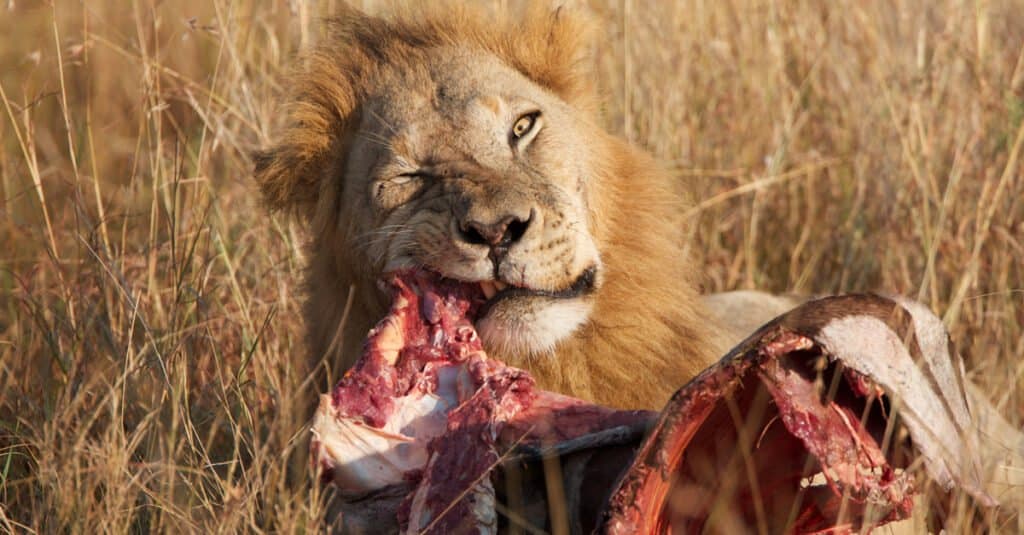
Sometimes in the Bible lions are symbolic of merciless enemies of God who want to devour his people.
©Richard Damian Knight/Shutterstock.com
Lions Symbolic of Future Peace
The prophet Isaiah composed one of the most beautiful depictions of a lion in the Bible. He describes the coming in the future of the Messiah, who will not only save Israel but bring peace to the entire earth. To symbolize this, Isaiah describes a lion that eats straw and lies down peacefully next to a lamb. Some people believe this describes the literal conditions that will exist in heaven in the future.
Others say that it is a symbolic description of the thorough peace that will exist on earth. The deepest sworn enemies, such as rival kingdoms and people groups on earth, will live together in permanent peace and harmony. Regardless of one’s religious faith, this hopeful image from the Bible is a powerful and poignant symbol of the peaceful world we can aspire to build.
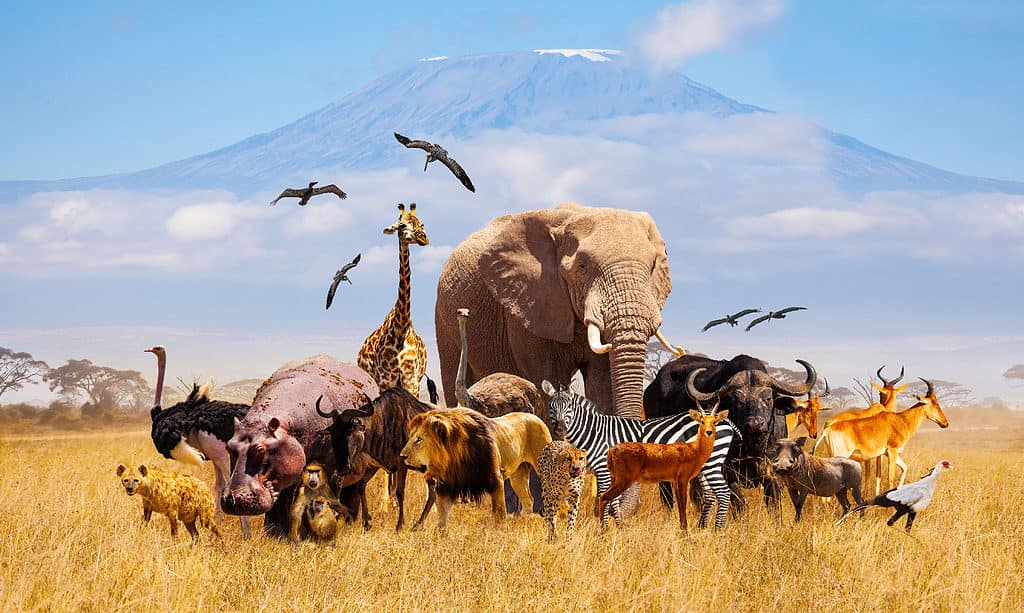
The Bible includes prophecies of a future world in which all animals and people will live at peace.
©Sergey Novikov/Shutterstock.com
Thank you for reading! Have some feedback for us? Contact the AZ Animals editorial team.

